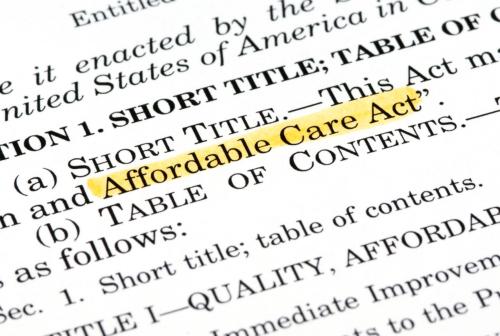Last week the issue of autism and vaccinations has come back into the public limelight, somewhat surprisingly, in the context of the GOP presidential debate.
This issue is so incredibly controversial that I feel the need, as a parent of a child on the autism spectrum but not a scientist in the field of biology or medicine, to say up front and unambiguously that I support vaccinations. I know there is no reason to believe that vaccines are a cause of autism and a good deal of empirical, statistical research to say they are not. I know, as my colleague Kavita Patel has written, that it would be highly dangerous to public health for the alternative interpretation to gain currency. And my wife and I still do vaccinate our children.
But I will also say the following: the angry dismissiveness with which many in the public health care arena address the concern of some parents — that vaccines may have contributed to their children’s autism — bothers me. I know what motivates most of them—the very real worry that many lives could be lost if many parents choose to avoid vaccinations for their children out of a misguided concern that the vaccines might cause or contribute to autism. That is a real worry – diseases could spread. But it’s also understandable that parents would not want their children to suffer from a vaccine.
But here is why the issue has bedeviled some of us who are parents.
- The estimated prevalence of autism among the nation’s youth has increased dramatically in recent decades, to considerably more than 1 child in 100 today, dozens of times more than a half century ago. Quite plausibly, something in the environment is contributing, and not just better diagnostics.
- Modern medicine has no fundamental explanation or theory about why the incidence rate is so high.
- The pacing and number of vaccines given to children has grown dramatically over roughly the same time period that autism incidence has accelerated (though admittedly, more recently, vaccination rates have plateaued somewhat while the incidence rates for autism keep growing).
- Autism tends to present symptoms at roughly the ages of maximum frequency of immunizations (1 to 2 years of age, though it can vary).
- For many years, vaccines were laced with mercury-based preservatives in far higher doses than was considered safe by the FDA. Mercury has been known to cause health problems such as poor attentiveness and motor dysfunctions that many children with autism also display. Ultimately, parents’ movements contributed to a change to this unnecessarily risky approach, except in cases where there was no realistic alternative. The fact that vaccine procedures took such unnecessary risks with children’s health for so long contributed to a climate of mistrust.
- Children often do get sick after being vaccinated, some much more so than others—underscoring that while the diseases that vaccines are designed to counter are extremely serious, vaccines themselves can be mildly risky to short-term health.
- Beyond that, the government acknowledges that some vaccines can be very risky to certain individuals. The government, in fact, established the National Vaccine Injury Compensation Program (VICP), which, according to its website, was created “…to ensure an adequate supply of vaccines, stabilize vaccine costs, and establish and maintain an accessible and efficient forum for individuals found to be injured by certain vaccines. The VICP is a no-fault alternative to the traditional tort system for resolving vaccine injury claims that provides compensation to people found to be injured by certain vaccines.”
- Although the statistics have been hard to access in many cases, there has been at least suggestive information that groups around the world less inclined towards vaccinations—like the Amish in the United States—suffer lower levels of autism than the mainstream American population. Of course, even if true, there could be many reasons besides vaccines to explain this situation.
- The fears of many parents persist even having learned of the fraudulent and indefensible character of Andrew Wakefield’s writings on the subject, which contributed in an irresponsible and fundamentally inaccurate way to the anti-vaccine movement of the 1990s.
Let me finish on a conciliatory note. Mercury-based preservatives are out of most vaccines today, yet incidence rates continue to climb, adding further evidence against the hypothesis that vaccinations could be a major cause of autism. Indeed, I know of no direct evidence of a vaccine ever causing autism—though again, I am not an expert. The diseases that vaccines counter are certainly more serious than the dangers of vaccines themselves.
Most likely, if I had to bet, I would wager that by 2050 or 2100, we’ll have figured out autism is typically caused by some combination of certain plastics, food additives, chemical pollutants, and perhaps unsuspected viruses or other organisms that afflict genetically susceptible children. My best guess, and certainly my hope, is that we will have even further debunked whatever lingering fears may exist that autism is triggered by vaccines in even a small percentage of the population that winds up with this heartbreaking ailment.
But given what we know today, if I had to do it all over, I’ll confess that I’d vaccinate my daughter somewhat more slowly, and space out the vaccines a bit more, than we did a dozen years ago. A growing number of pediatricians now condone this approach, even if that does not mean they all encourage it. This thinking is not based on any anti-vaccine agenda, only the reality that as a parent, I like to eliminate even small dangers to my children’s health, even when I’m not sure there is a danger. That’s what parents do. And that’s why, while disagreeing with most of their specific answers, I’m not quite as thoroughly offended by the answers of the GOP hopefuls who spoke on this subject as much of the mainstream media seems to be. Still, in the interest of public health, all should come out and encourage vaccinations.
And perhaps for those parents who worry that the current vaccine protocol and schedule, much more intensive than in past decades, is concerning, an official option could be allowed for a slightly slower approach as a matter of personal choice. This would allow the federal government to stand by its current position that there is no real reason for worry about vaccines, but at the same time recognize that some parents prefer an admittedly hyper-cautious approach.



Commentary
Vaccines, autism and nervous patients
September 21, 2015